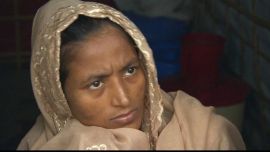
Traditional Rohingya midwives helping pregnant refugees
In Bangladesh, 130 community healthcare workers have been recruited by UNFPA from among the Rohingya.
Cox’s Bazar, Bangladesh – During the hottest hour of the day, in the world’s largest refugee settlement, two Rohingya traditional midwives are searching for a woman who needs their help.
Rojia Begum and Sadia Begum are two of the 130 community healthcare workers who’ve been recruited by the United Nations Population Fund (UNFPA) from among the Rohingya residing in Bangladesh.
Keep reading
list of 4 itemsPalestinian Prisoner’s Day: How many are still in Israeli detention?
‘Mama we’re dying’: Only able to hear her kids in Gaza in their final days
Europe pledges to boost aid to Sudan on unwelcome war anniversary
When they find Rujina, who is about to give birth to her third child, they explain how they’ll assist with her delivery and outline all the medical options available.
“We didn’t get to see any doctors in Myanmar,” Rujina told Al Jazeera, adding that she had no idea care like this was possible.
“The doctors there are Buddhists. They wouldn’t treat us because we are Muslims.”
In another part of the camp, these newborns and their mothers are being looked after in a facility run by UNFPA, a novel experience for a population of refugees with largely conservative attitudes towards reproductive health.
One of the biggest challenges for aid workers has been trying to convince Rohingya women here to go to clinics voluntarily.
Because of the unrelenting persecution they faced in Myanmar, many of them are distrustful and fearful of medical facilities.
Since August 2017, Sadia Begum has come to the aid of numerous Rohingya women subjected to extreme physical, psychological and sexual violence by the Myanmar military. As plainly and painfully as she can, she explains why the women she helps are so fearful.
“These women are always scared that the doctors will kill their babies,” said Sadia.
Despite the obstacles, aid workers say providing services that aim to ensure not just safer pregnancies and childbirth, but also options for family planning, are already having an impact.
“We’ve seen a real increase in the number of women who elect to have the longer-acting contraceptives,” says UNFPA’s Carly Learson.
“We’re also seeing a big increase in the number of men who are being supportive of their wives doing that. A lot of women have decided that they’ve had enough children and they want to get on with their lives, learn a new skill, and don’t want to have any more children.”
Down another alleyway in the camp, Raja and Sadia continue their work and locate a refugee woman pregnant with her first child.
Dispensing wisdom to the anxious mother-to-be, they do what they can to provide a kind of comfort this woman has never known.